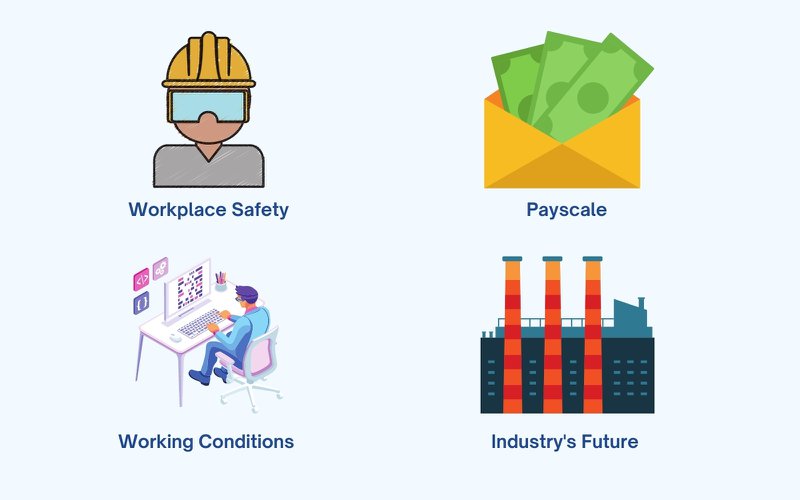What is a good career path? If you’re thinking about new places to live or new industries to work, and then you move to states like Texas, New Mexico, or even California and get surprised with a good offer from a traditional industry such as oil and gas, you might be asking yourself, is oil & gas production a good career path? Especially in times of renewable energy.
Each of us might have a different answer to this. Some of us will look for the best paychecks. Others might base their decision on the working conditions. Other on the environment.
The oil and gas production industry is still going strong. There have been concerns about a crude oil shortage and the health of our environment. But the industry chose to adapt to these changes. Big oil and gas companies now pay greater attention to carbon management.
Are you looking to pursue a career in the energy sector? Then let’s get one question out of the way. The industry is not going anywhere. And as always, it continues to provide a variety of employment opportunities.
But is oil & gas production a good career path for you? Well, that is a question only you can answer best. So, let’s dive right into it and look at all the different aspects! All we can do is help you in making an informed decision.
Oil and Gas Production Jobs: Important Things to Know

Every industry has its pros and cons. There are areas where one sector does well. And it might fail to reach that standard in other areas. Let’s find out where the oil and gas industry stands in this regard.
Workplace Safety
Workplace safety has always been a concern in the oil and gas production industry. But, don’t worry; we have some good news in this regard. In recent years, the industry has been paying particular attention to workplace safety.
The new safety protocols have significantly reduced the incident rate. Before these changes, worker safety was a significant concern in the industry. As a result, many people opted out of a career in oil and gas production. But you need not worry about workplace safety anymore.
The rejuvenated safety standards are a welcome change. So, here’s one box you can tick on your way to making a decision.
Payscale
Will I ever get to make a lot of money? This is a question people ask before making a career choice. Will I stand a chance of getting hefty paychecks someday? Well, there’s good news here as well. Oil and gas production jobs can be lucrative.
Oil and gas production jobs also allow you to work abroad. As you would expect, these offshore job opportunities come with handsome pay. Thanks to wide profit margins, there are loads of lucrative jobs to be had in the industry.
Is oil & gas production a good career path? Well, it surely ticks the good salaries box for you! So, here’s another point in favor of working in the industry.
Working Conditions
Some people like working field jobs. Others prefer spending their working hours in a furnished, air-conditioned office. So where do you want to spend your working hours? And let’s see how the state of working conditions in oil and gas production jobs.
Now, the work conditions in the industry vary based on the position. For example, you can be sitting in a comfortable office or working in extreme conditions. The offshore rigs have the most challenging working conditions. And only a tiny percentage of oil and gas jobs are offshore.
The work conditions depend on your job position and location. So, this is a factor that needs close inspection.
After all, you might end up working in harsh conditions. Some people want to take up the challenge and go ahead. Others steer away from toiling in extreme conditions. So, where do you stand on this?
Industry’s Future
Nobody wants to work in an industry that has no future. And many people say that oil and gas production is an industry of the past. But is there any truth to this assertion? Well, one may have their opinion about the future, but here’s what the numbers suggest.
The oil and gas industry supports 9.8 million jobs in the US. And these jobs make up 5.6 percent of total US employment. So, what do these numbers tell you? Does it look like an industry that has no future? Well, the choice is yours to make!
As the numbers suggest, there are plenty of jobs in oil and gas production. They range from entry-level jobs to administrative positions. But there are some sought-after job positions in the oil and gas industry.
These job positions pay well and have massive room for growth. But what are your thoughts on the industry up till now? Is oil & gas production a good career path? Have you gotten any closer to making a decision?
If not, let’s dig deeper and get an overview of some of the job positions!
Diverse Career Paths in the Oil and Gas Industry
The oil and gas industry has a variety of career paths. You can pick your way based on your interests and qualifications. Remember, the list below doesn’t contain all the options out there.
We mention five different career paths within the oil and gas industry. These range from engineering to marketing and analysis. So, let’s see if any of these job positions appeal to you.
Mud Logger
Let’s start with one of the offshore jobs. A Mud logger is responsible for monitoring the drilling activities. He records information about the status of the well as the extraction takes place. As you would expect, this job requires you to be on-site.
The working hours will vary depending on the company. But Mud loggers usually work twelve hours a day. They typically spend two weeks offshore and two weeks at home. In some situations, Mud loggers might have to work for four weeks in a row.
The salary of a Mud logger depends on the experience. It can go as high as $65,000 if the company is happy with your experience. On average, the pay of a Mud logger ranges from $39,162 to $47,260 in the United States.
Mining Engineer
The mining engineer ensures the efficient development of mines and other surfaces. They are involved in every stage of the mining project. However, the bulk of their work is before the development of a new site.
A mining engineer starts by assessing the viability of a mining site. He also makes sure that the mining process goes on in the best way possible. They also oversee the closure and rehabilitation of the mining site. The job of a mining engineer involves long work hours. Also, the job is mostly overseas.
So, it can be a good career path for those looking to travel the world as they work. However, some research positions require a doctorate in topics related to geology.
The salary of a mining engineer differs based on experience and skills. But, on average, it ranges from $58,272 to $100,444 in the United States. So, there’s enough room for growth if you choose to become a mining engineer.
Marketing Coordinator
You don’t need a scientific or engineering background to work in oil and gas production. There are numerous marketing jobs available in the biggest oil and gas companies. The marketing coordinator is responsible for overseeing marketing and supply operations.
They also have to work closely with client services to ensure a smooth supply chain. Furthermore, they might also have to prepare reports on the sale and supply of products. The working hours of the marketing coordinator are usually from 9 to 5.
The salary of the marketing coordinator depends heavily on years of experience. But the average salary in oil and gas marketing jobs in the US is $76,375.
So, is oil & gas production a good career path? Well, it sure is a diverse one. And there are a plethora of opportunities in different fields.
Energy Engineer
Energy Engineers are responsible for designing renewable energy technologies. Their goal is to provide efficient and innovative ways to provide energy. Their job involves carrying out energy surveys and site inspections.
Energy engineers have to work on-site or in an office or laboratory. So, for example, during drilling operations, they might have to work a 7-day shift. And they spend most of this time on-site.
To become an energy engineer, you need to have a degree in a scientific or engineering subject. In recent years, there has been a rise in specialist qualifications for the job. These specialist qualifications include sustainable energy and climate science.
In the US, the average salary of an energy engineer is $73,974. However, their salary usually falls between $65,633 and $95,561. As you would expect, the salary will depend on skill and experience.
Petroleum Engineer
A Petroleum engineer is a part of all stages in an oil and gas field. They’re involved in assessment, development, and production.
There are reservoir engineers to assist in risk assessment. In addition, drilling engineers supervise all the drilling operations and the cost. So, there are various paths you can choose as a petroleum engineer.
The working hours of a petroleum engineer are usually 9 to 5. The average salary of an entry-level petroleum engineer in the US is $96,210. However, the pay typically falls between $87,881 and $106,371 based on skills and experience.
Engineering Geologist
The job of the engineering geologist is to assess geographical risks. They analyze the factors that can cause problems for the engineering processes. The workload of an engineering geologist is lesser than other oil and gas jobs. For example, they usually don’t have to work 7-day shifts.
On average, an engineering geologist in the US earns a salary of $48,487. However, based on experience and skill, the salary usually falls between $45,280 and $64,623.
Commercial Analyst
For those with an analytical eye, there are various jobs in oil and gas companies. The function of a commercial analyst includes developing a business plan for development. In addition, they need to work in collaboration with different teams.
They ensure that all the development activities are in line with the new regulations. And they facilitate meetings to prepare agendas for marketing their products globally.
Again, the salary of a commercial analyst will depend on their years of experience. The work hours of a commercial analyst are usually 9 to 5. They typically don’t have to work week-long shifts like offshore engineers.
There are numerous similar job opportunities in the biggest oil and gas companies. These include sales and marketing analysts, sales engineers, and marketing specialists. Also, there is no shortage of marketing opportunities in oil and gas production. Chevron, for example, has 6,000 marketing colleagues in 90 different countries.
No matter where you are in the world, you can work in big oil and gas companies. And as we can see, the lack of a scientific degree will not stop you from working in the sector.
Stability and Long-Term Work
As you can see, there are various job opportunities in the oil and gas industry. So, is oil & gas production a good career path?
We’re pretty sure you’re closer to making an informed decision. In addition, there is an excellent room for growth in the oil and gas industry.
We’re always looking for a stable career path. We want jobs in an industry that doesn’t go into turmoil. And the oil and gas industry ticks this box as well. As we discussed above, the future of the sector seems secure. As a result, there is a global need for workers in the industry.
The industry also has a wide range of career paths to choose from. There are entry-level jobs that don’t even need you to have a college degree. That’s how diverse the employment opportunities in the industry are.
So, where do you stand on the decision now? Are you gearing up to apply online for a position in a significant oil and gas company?
Want To Learn About Other Career Paths?
If you want to know more about other career paths, check out this list on Totempool. You will be able to make your choices with solid information before moving to a particular industry:
- Basic industries
- Broadcasting
- Business Services
- Capital Goods
- Commercial Banking
- Consumer Services
- Energy
- Healthcare
- Industrial Machinery
- Life Insurance
- Major Banks
- Major Pharmaceuticals
- Metal Fabrication
- Consumer Non-durables
- Packaged Foods
- Precious Metals
- Real State Investment Trusts
- Transportation
If you are indecisive about the area, you want to work. Here we list a few functional career paths:
As more industries are published on the website, we will keep updating the list for you. If you want to learn how to choose your career path, check out this article.

Ranu Kumari is a Professional Writer and a Marketing enthusiast who currently runs her own Marketing Consultancy, LatitudeBOX. She has written promotional articles for multiple brands and has published her work in Scopus indexed journals. She is passionate about expressing her thoughts and ideas to connect with her readers in a voice that they understand.
